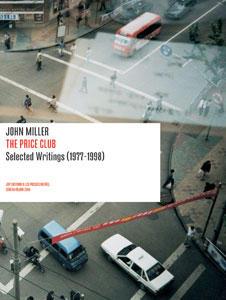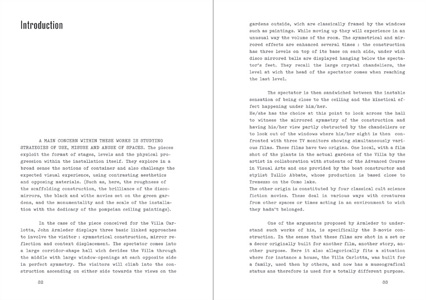A critical analysis of post-war practice and theory.
The “Positions” collection is dedicated to the publication of artist's writings. John Miller perfectly embodies the aim of this series : to interrogate artistic and curatorial practices as well as theory, through the singular position of artists, involved in both their own and other artist's works. This production/reception question might even be a real dialectic in Miller's case. From his early writings, in fact, he argues that the artist has no other choice but to confront sociopolitical questions, the ideological apparat uses involved in the production of cultural “artifacts” and, therefore, the theoretical corpus (be it Walter Benjamin, the Frankfurt School, or feminist and poststructuralist writings) that enables one to (re) conceive these dimensions of artmaking. From “polemical” texts to extensive theoretical essays, passing through
Ed Ruscha, Bruce Nauman or
John Baldessari, these writings have proved to be among the most challenging ones.
“Miller manages to combine a shrewd understanding of art-historical correlations with a daunting knowledge of popular culture.” – Bruce Hainley,
Artforum (Summer 2001)
“Miller is an erudite and sophisticated analyst and reporter of the most complex post-war thought.” –
Liam Gillick,
Art Monthly (September 2001)
Among such contemporaries as
Mike Kelley and
Jim Shaw, but also
Tony
Oursler and Stephen Prina, John Miller (born 1954 in Cleveland, Ohio, lives and works in New York City and Berlin) embodies a singular position: he
articulates the synthesis of an ideologically committed critique of
representation with a postconceptual shift toward the “real.” Using
completely stereotyped genres (figurative painting, travel photography,
landscape painting, and so on), Miller, like
Sherrie Levine and
Richard
Prince, has, since the end of the 1970s, challenged the function of the
author and the concomitant loss of aura of the artwork. Yet this critique
is for him only a means of revealing the repressed aspect of the
ideological aggregates of day-to-day late-capitalist Western culture.
First noticed for his brown “faux” abstract painting and objects
recovered by a brown impasto, he resisted to what he calls “aesthetic
appropriation” by regularly shifting his practice, introducing series such
as the “Middle of the Day” photographs, game show sets and paintings,
and golden maquettes through the 1980s and 1990s. This strategy of
resistance to a reduction of his work to any critical tag explains why,
despite the early critical recognition of his work by theoreticians such
as Hal Foster, he is still overlooked among his generation.
Also a writer, John Miller became in 1987 the US Editor for
Artscribe; he founded
Acme Journal in 1991. For the past two decades, he has written intensively and published texts in
Artforum,
October and
Texte zur Kunst, as well as in numerous museum publications. He has taught art at Columbia University, the School of Visual Art in New York, Yale University, and Cooper Union.


